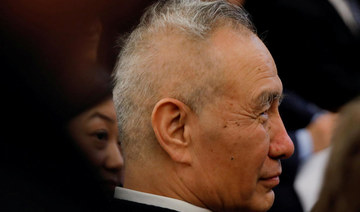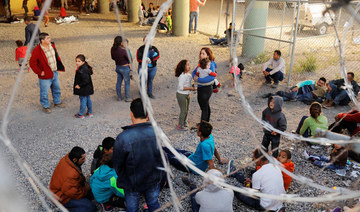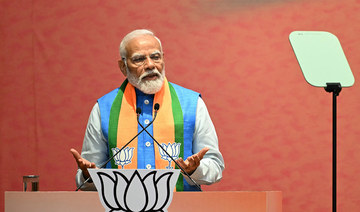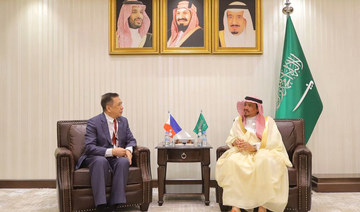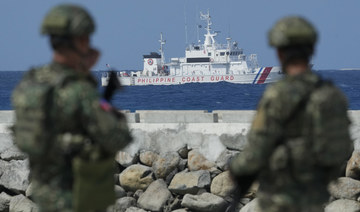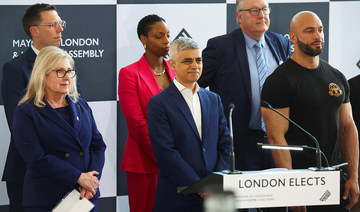WASHINGTON: Homeland Security Secretary Kirstjen Nielsen resigned on Sunday amid the administration’s growing frustration and bitterness over the number of Central American families crossing the southern border, two people familiar with the decision said.
President Donald Trump thanked her for her work in a tweet and announced US Customs and Border Protection Commissioner Kevin McAleenan would be taking over as acting head of the department. McAleenan is a longtime border official who is well-respected by members of Congress and within the administration. The decision to name an immigration officer to the post reflects Trump’s priority for a sprawling department founded to combat terrorism following the Sept. 11 attacks.
Though Trump aides were eyeing a staff shake-up at Homeland Security and had already withdrawn the nomination for another key immigration post, the development Sunday was unexpected.
Nielsen traveled to the US-Mexico border on Friday with Trump to participate in a roundtable with border officers and local law enforcement. There she echoed Trump’s comments on the situation at the border, though she ducked out of the room without explanation for some time while Trump spoke. As they toured a section of newly rebuilt barriers, Nielsen was at Trump’s side, introducing him to local officials. She returned to Washington afterward on a Coast Guard Gulfstream, as Trump continued on a fundraising trip to California and Nevada.
But privately, she had grown increasingly frustrated by what she saw as a lack of support from other departments and increased meddling by Trump aides, the people said. She went into a meeting with Trump at the White House in Sunday not knowing whether she’d be fired or would resign, and she ended up resigning, they said.
Her resignation later, obtained by The Associated Press, had not a whiff of controversy unlike others who have left from the administration.
“Despite our progress in reforming homeland security for a new age, I have determined that it is the right time for me to step aside,” she wrote. “I hope that the next secretary will have the support of Congress and the courts in fixing the laws which have impeded our ability to fully secure America’s borders and which have contributed to discord in our nation’s discourse.”
There have been persistent tensions between the White House and Nielsen almost from the moment she became secretary, after her predecessor, John Kelly, became the White House chief of staff in 2017. Nielsen was viewed as resistant to some of the harshest immigration measures supported by the president and his aides, particularly senior adviser Stephen Miller, both on matters around the border and others like protected status for some refugees. Once Kelly left the White House last year, Nielsen’s days appeared to be numbered. She had expected to be pushed out last November, but her exit never materialized. And during the government shutdown over Trump’s insistence for funding for a border wall, Nielsen’s stock inside the White House even appeared to rise.
But in recent weeks, as a new wave of migration has taxed resources along the border and as Trump sought to regain control of the issue for his 2020 re-election campaign, tensions flared anew.
Arrests all along the southern border have skyrocketed in recent months. Border agents are on track to make 100,000 arrests and denials of entry at the southern border this month, over half of which are families with children.
Nielsen advocated for strong cybersecurity defense and often said she believed the next major terror attack would occur online — not by planes or bombs. She was tasked with helping states secure elections following Russian interference during the 2016 election.
She dutifully pushed Trump’s immigration policies, including funding for his border wall, and defended the administration’s practice of separating children from parents, telling a Senate committee that removing children from parents facing criminal charges happens “in the United States every day.” But she was also instrumental in ending the policy.
Under Nielsen, migrants seeking asylum are waiting in Mexico as their cases progress. She also moved to abandon longstanding regulations that dictate how long children are allowed to be held in immigration detention, and requested bed space from the US military for some 12,000 people in an effort to detain all families who cross the border. Right now there is space for about 3,000 families and facilities are at capacity.
Homeland Security Secretary Nielsen has resigned
Homeland Security Secretary Nielsen has resigned
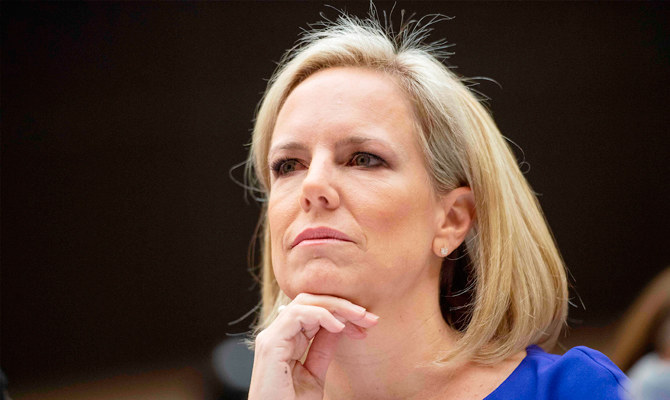
- There have been persistent tensions between the White House and Nielsen almost from the moment she became secretary, after her predecessor, John Kelly, became the White House chief of staff in 2017
Modi’s BJP skips Kashmir as Indian election enters fourth phase

- Millions of Indians across 96 constituencies began voting on Monday
- Ruling party is not fighting elections in Kashmir for first time in 30 years
NEW DELHI: India’s ruling Bharatiya Janata Party is not contesting elections in the Muslim-majority region of Kashmir for the first time in nearly three decades, as voting in the latest round of the national polls got underway on Monday.
The world’s most populous country began voting on April 19 in a seven-phase election that is scheduled to take place over six weeks, with ballots set to be counted on June 4.
India has 968 million people eligible to vote in the general election, where incumbent Prime Minister Narendra Modi and his Hindu nationalist BJP are aiming for a rare third consecutive term in power.
Monday’s voting involved 96 constituencies in the fourth round of polling.
While the BJP, which has been in power since 2014, and its allies are contesting every other part of India as they look to secure a majority of the 543 parliamentary seats, the party is sitting out in the northern Himalayan territory of Jammu and Kashmir.
This year marks the region’s first election since Modi’s government stripped the valley of its special autonomous status and statehood — which was granted by the Indian Constitution — on Aug. 5, 2019. The move unilaterally revoked the relevant provisions under Article 370, scrapping Kashmir’s flag, legislature, protections on land ownership and fundamental rights, sparking fears of demographic engineering in the region.
“It’s really surprising that the BJP, which claimed to have over 800,000 cadres in the valley, failed to find a single candidate. It shows that the BJP is not popular in the valley,” Sanjay Tickoo, the Srinagar-based leader of the Hindu minority group Kashmiri Pandit, told Arab News.
“I am expecting a record turnout to show the central government what (they) have done to the people of Jammu and Kashmir. This is the reflection of anger … no one is happy in the valley after the abrogation of Article 370.”
Indian-controlled Jammu and Kashmir is part of the larger Kashmiri territory, which has been the subject of international dispute since the 1947 partition of the Indian subcontinent into Hindu-majority India and Muslim-majority Pakistan. Both countries claim Kashmir in full and rule in part.
Modi said his government had been focusing on jobs and development as part of an effort to end violence in the valley, which has for decades witnessed outbreaks of separatist insurgencies to resist control from the government in New Delhi.
But after the BJP lost Kashmir’s three seats in the 2019 election, the party’s popularity slid further after it revoked the region’s autonomous status later the same year and subsequently imposed months of strict communication blockade and jailed hundreds of political leaders.
“The vote expresses not only anger but also apprehension against the anti-Muslim rants that have been going on as well as whatever they have done in Kashmir,” Professor Sheikh Showkat, a Srinagar-based political analyst, told Arab News.
Altaf Thakur, BJP spokesperson in Kashmir, said the party was still taking part in the Kashmir polls by supporting other regional parties.
“It is not correct to say that we are not fighting the election, we are playing the role of kingmaker and whichever way the cadres of the BJP will go, we will win,” he told Arab News.
“It’s not important whether we stand in the elections or not, the important thing is that we have to defeat the dynasty rulers,” he said, referring to the main contenders in the Kashmir polls, the National Conference and People’s Democratic Party.
While they are fighting each other in the valley, both parties have said they oppose the BJP and are part of the Congress party-led opposition alliance, known as India.
For some Kashmiri voters, Monday’s vote was about speaking up for themselves.
“The BJP knew that they cannot tolerate the wrath of the people of Kashmir. They fled the contest without a fight,” Aijaz Ahmed, a businessman from Srinagar, told Arab News.
“I voted today because it gave me an opportunity to express myself and tell the government in Delhi that you cannot keep us silenced. We want an atmosphere without fear and a region where our own identity is not questioned.”
5,000 Filipino pilgrims expected to fly to Makkah for Hajj

- Travelers ‘can expect VIP-like treatment,’ National Commission on Muslim Filipinos says
- First pilgrims will take off from Manila International Airport next week
MANILA: Thousands of Filipino pilgrims are set to travel to Makkah for the upcoming Hajj pilgrimage, the National Commission on Muslim Filipinos said on Monday, with the first batch set to leave for Saudi Arabia next week.
In the predominantly Catholic Philippines, Muslims constitute about 10 percent of the nearly 120 million population. Most live on the island of Mindanao and the Sulu archipelago in the country’s south, as well as in the central-western province of Palawan.
The commission said that nearly 5,000 Muslims had confirmed they would travel to Saudi Arabia to perform the Hajj pilgrimage this year.
“We have already processed 96 percent of the pilgrims,” Zainoden Usudan, chief of Hajj operations at the NCMF’s Bureau of Pilgrimage and Endowment, said.
“They can expect VIP-like treatment, allowing them to fully concentrate on their pilgrimage.”
Officials from the commission have been working hard to ensure that the difficulties faced by pilgrims last year will not be a problem this time around.
“This time, we are making sure that food will not be a problem,” Usudan said, referring to problems with delayed meal deliveries in 2023.
He said the commission was working with a service provider in the Kingdom that had contingency plans for all aspects of the trip, including transportation.
The first Hajj flight from the Philippines is set to take off from Manila International Airport on May 23.
One of the five pillars of Islam, this year’s Hajj is expected to run from June 14-19. Many pilgrims extend their stays to make the most of the once-in-a-lifetime opportunity to fulfill their religious duty.
Charities brand UK family reunion system for asylum-seekers ‘broken’

- New report says thousands waiting for relatives to be relocated to Britain
- Refugee Council CEO: ‘The UK has clearly failed the Afghan refugees that it promised to protect’
London: Charities in the UK have branded the country’s system for reuniting separated families of asylum-seekers “broken,” calling for the Home Office to “fix and expand” it.
A new report published by the Refugee Council and Safe Passage International has highlighted figures showing a backlog of more than 11,000 migrants in the UK waiting to be reunited with relatives during the summer last year.
Despite repeated freedom of information requests, the Home Office has not provided updated figures since then.
The report mentioned that a particular problem faces separated Afghan families, with many individuals reaching the UK but finding themselves in prolonged legal difficulty and their relatives forced to remain in Afghanistan, neighboring Pakistan or elsewhere.
Currently, Afghans evacuated from their country as part of Operation Pitting in August 2021 are prevented from automatically bringing close family to the UK.
In October 2023, the British government proposed a new system to address this issue, but the plan has yet to implemented despite pressure from MPs and members of the House of Lords.
Approved asylum-seekers can apply for a family reunification visa, but thousands find themselves stuck in a backlog of cases despite the Home Office saying the process should take under 12 weeks.
The Independent spoke to a number of Afghans, including a former pilot, struggling to be reunited with their relatives.
The pilot told the newspaper: “They (his family) have been waiting for a visa for five months in Iran, but so far there is no news from the embassy and there is no guarantee it will be issued.
“My family are facing a lot of problems. They don’t have a proper place to live, and don’t have access to a doctor, because they are living illegally.
“Their Iranian visas have expired and they need to extend them, but it is impossible. My wife is suffering mentally and emotionally, and she is completely (without hope).”
Another issue is that of unaccompanied children who, under current rules, also cannot use their status to automatically relocate their families to the UK.
The Independent spoke to one Afghan teenager, Farhad, rescued from Kabul without his parents in 2021, who faces an anxious wait to see if his family can join him in the UK.
“(The UK government) promised in 2021 that they’re going to bring the families, but it’s still been almost three years,” he said.
“My mum and my siblings are in Pakistan because they needed a doctor and medication. But my father couldn’t get the visa to go with them.
“I am doing my GCSEs this month and I can’t really focus on my studies knowing that my family is struggling.”
Safe Passage International highlighted the case of another young boy, Ahmad, who had tried to join his older brother in the UK.
Despite both his parents having died in Afghanistan, the Home Office denied that he had any “serious and compelling” circumstances to justify his asylum application.
He was only able to stay in the UK after a judge intervened, ordering the Home Office to provide assistance.
Safe Passage International’s CEO Dr. Wanda Wyporska told The Independent: “Nearly three years on, it’s a national shame that Afghans, who risked so much to support UK military operations, are still waiting for a way to bring their family to safety here with them. Their family members are living in fear every day of the Taliban.”
The Refugee Council’s CEO Enver Solomon said: “The UK has clearly failed the Afghan refugees that it promised to protect, by keeping families separated for so long with no information on how they may be reunited.
“After risking everything for the UK, Afghans and their families should not be forced to make dangerous boat journeys to get here, nor should they face hostile, inhumane policies like the Rwanda plan when they do make it to the UK.”
A Home Office spokesperson told The Independent: “We made one of the largest commitments of any country to support people from Afghanistan, and so far we have brought around 27,900 individuals to safety in the UK, including thousands under our Afghan resettlement schemes.
“In October we committed to establish a route for those evacuated from Afghanistan under Pathway 1 of the Afghan Citizens Resettlement Scheme without their immediate family members, to reunite them in the UK.
“We remain on track to meet that commitment and open the route for referrals in the first half of this year.”
Philippines to tighten guard at locations in South China Sea

- Philippine Coast Guard deploys ship to Sabina Shoal on the Spratly archipelago, where it accused China of building an artificial island
MANILA/BEIJING: The Philippines said on Monday it would keep a closer guard on reefs, shoals and islets in its exclusive economic zone in the South China Sea, alarmed by reports of new reclamation activities by China, which Beijing denied.
The Philippine Coast Guard said on Saturday it had deployed a ship to Sabina Shoal on the Spratly archipelago, where it accused China of building an artificial island, having documented what it said were piles of dead and crushed coral on the sandbars.
Jonathan Malaya, spokesperson of the National Security Council (NSC), said NSC chief Eduardo Ano had ordered a tighter guard at locations within Manila’s 200-nautical mile economic zone, as a long-standing diplomatic row with Beijing intensifies.
“No one will guard (these locations) except us. It is our responsibility under international law to guard (them) and ensure that the environment there would not be damaged and that there won’t be reclamation activities,” Malaya told a regular television program.
China claims almost all the South China Sea, including parts claimed by the Philippines, Brunei, Malaysia, Taiwan and Vietnam, and has carried out extensive land reclamation on some islands, building military facilities, causing concern in Washington and the region.
China’s foreign ministry on Monday dismissed Manila’s latest accusation as “groundless and pure rumor.”
“Recently, the Philippine side has repeatedly spread rumors, deliberately smeared China and attempted to mislead the international community, which is futile,” spokesperson Wang Wenbin told a regular briefing.
He urged Manila to “return to the right track of properly settling maritime disputes through negotiation and consultation.”
Philippine Coast Guard spokesperson Jay Tarriela said its presence at the Escoda shoal had deterred China from doing small-scale reclamation, but that scientists would have to determine whether the piles of coral were natural or man-made.
He said the coast guard was committed to maintaining a presence at the shoal, just over 120 nautical miles from the Philippine province of Palawan.
The Permanent Court of Arbitration ruled in 2016 that Beijing’s claims in the South China Sea, a vital waterway, had no basis under international law, a decision that China rejects.
The Sabina Shoal, known locally as Escoda, is the rendezvous point for vessels resupplying Filipino troops stationed on a grounded warship at the Second Thomas Shoal, where Manila and China have had frequent run-ins.
Ano has called for Chinese diplomats to be expelled over the alleged leak of a phone conversation with a Filipino admiral about the maritime dispute.
On Monday, the Philippine foreign ministry said it would look into reports of “illegal and unlawful activities” by diplomatic officials, but did not name China.
3 men charged in the UK with assisting the Hong Kong intelligence service

- The men will appear at Westminster Magistrates’ Court charged under the National Security Act
LONDON: Three men have been charged with allegedly assisting Hong Kong intelligence services and with foreign interference, London’s Metropolitan Police said Monday.
The men will appear at Westminster Magistrates’ Court charged under the National Security Act.
Chi Leung (Peter) Wai, 38, Matthew Trickett, 37, and Chung Biu Yuen, 63, have each been charged with assisting a foreign intelligence service.
“While these offenses are concerning, I want to reassure the public that we do not believe there to be any wider threat to them,” said Commander Dominic Murphy, Head of the Met’s Counter Terrorism Command.
“This investigation remains ongoing, but now that charges have been brought, I urge people not to speculate or comment further in relation to this case.”
Hong Kong’s security bureau, Hong Kong police and the office of China’s foreign ministry in Hong Kong did immediately respond to requests for comment.




